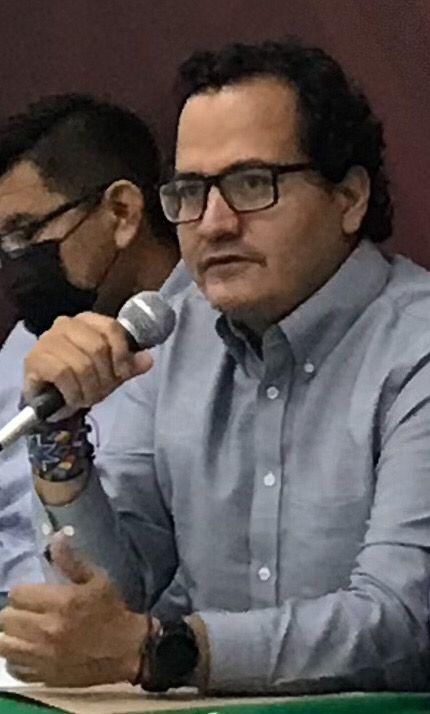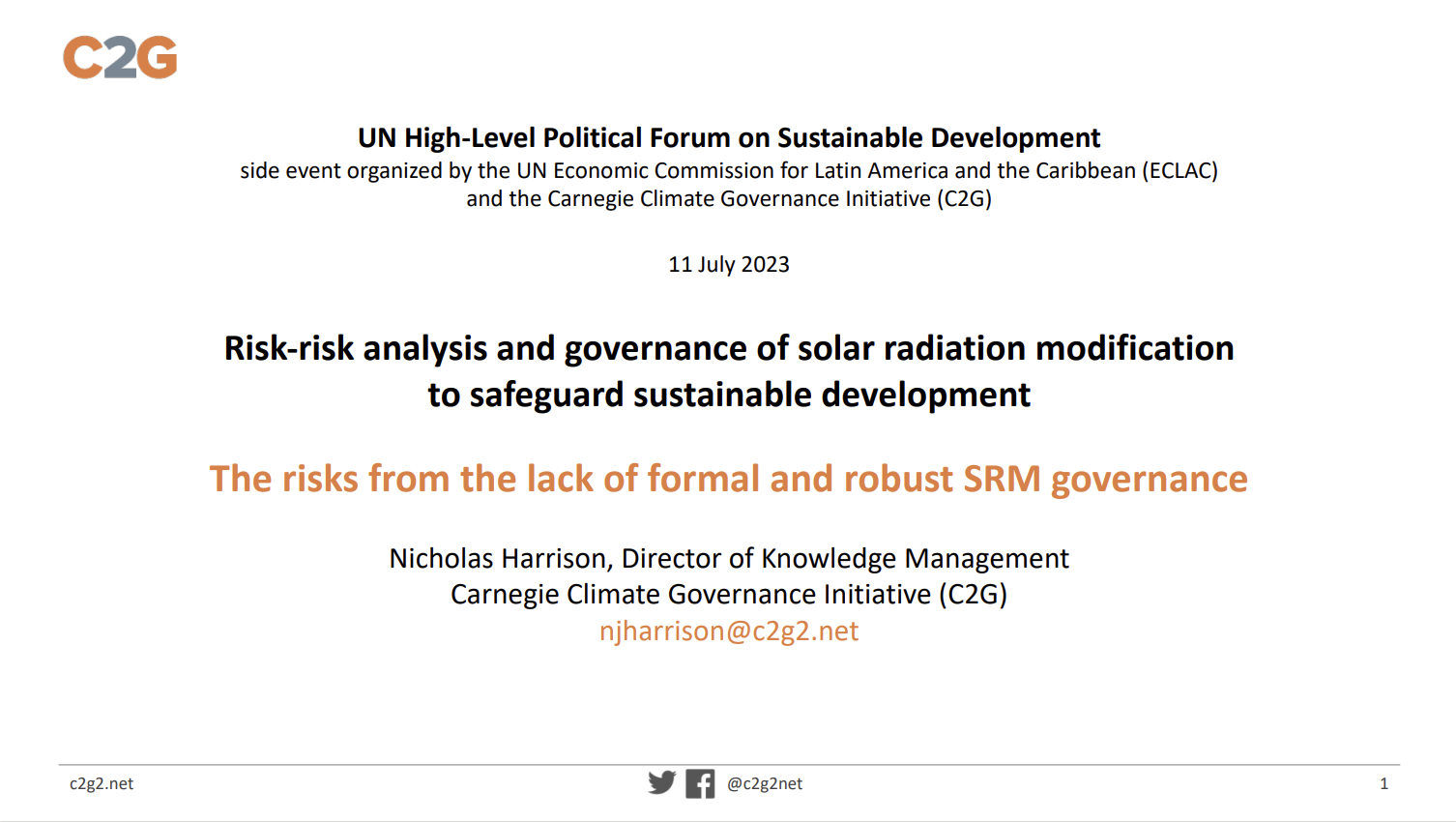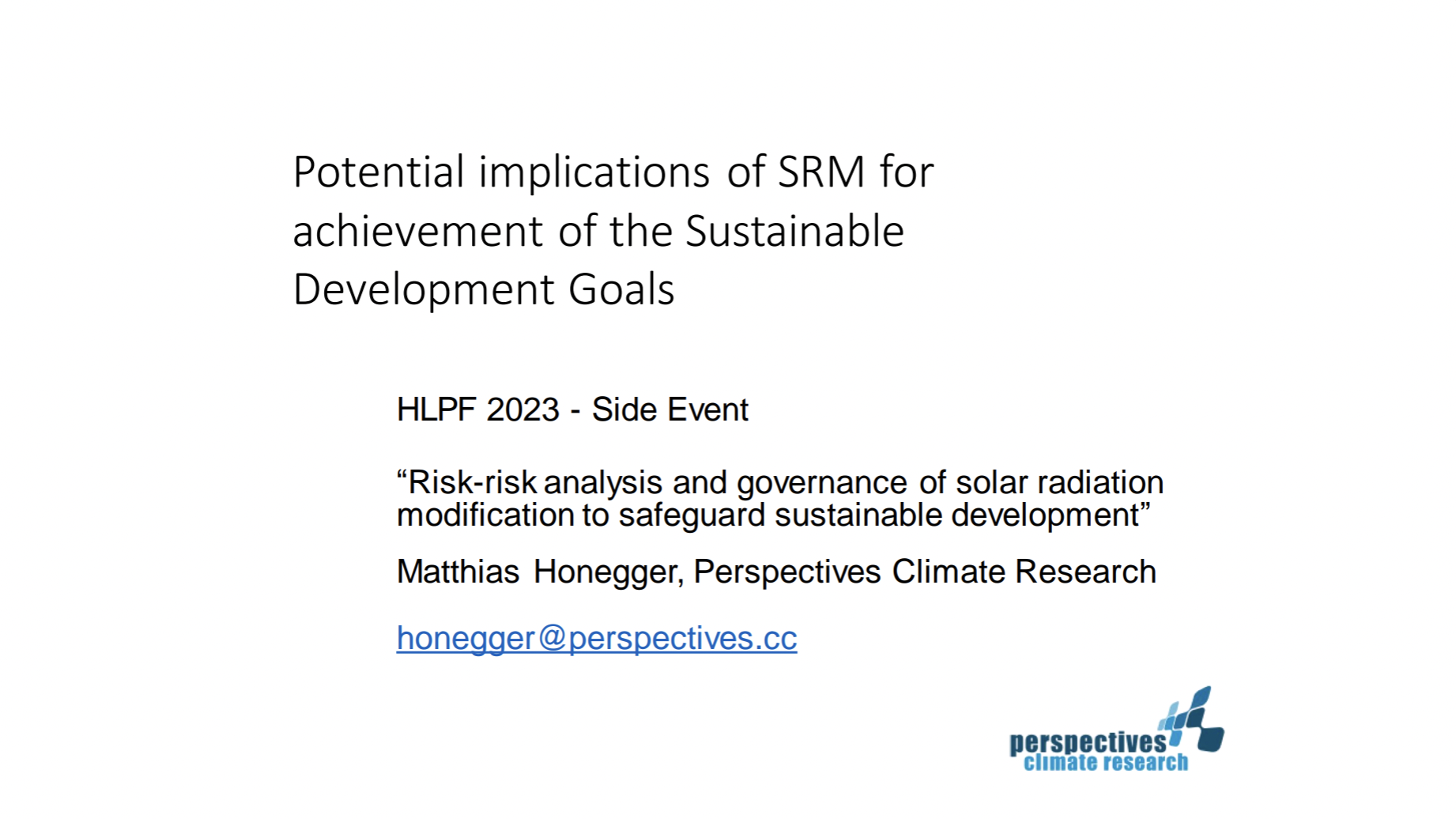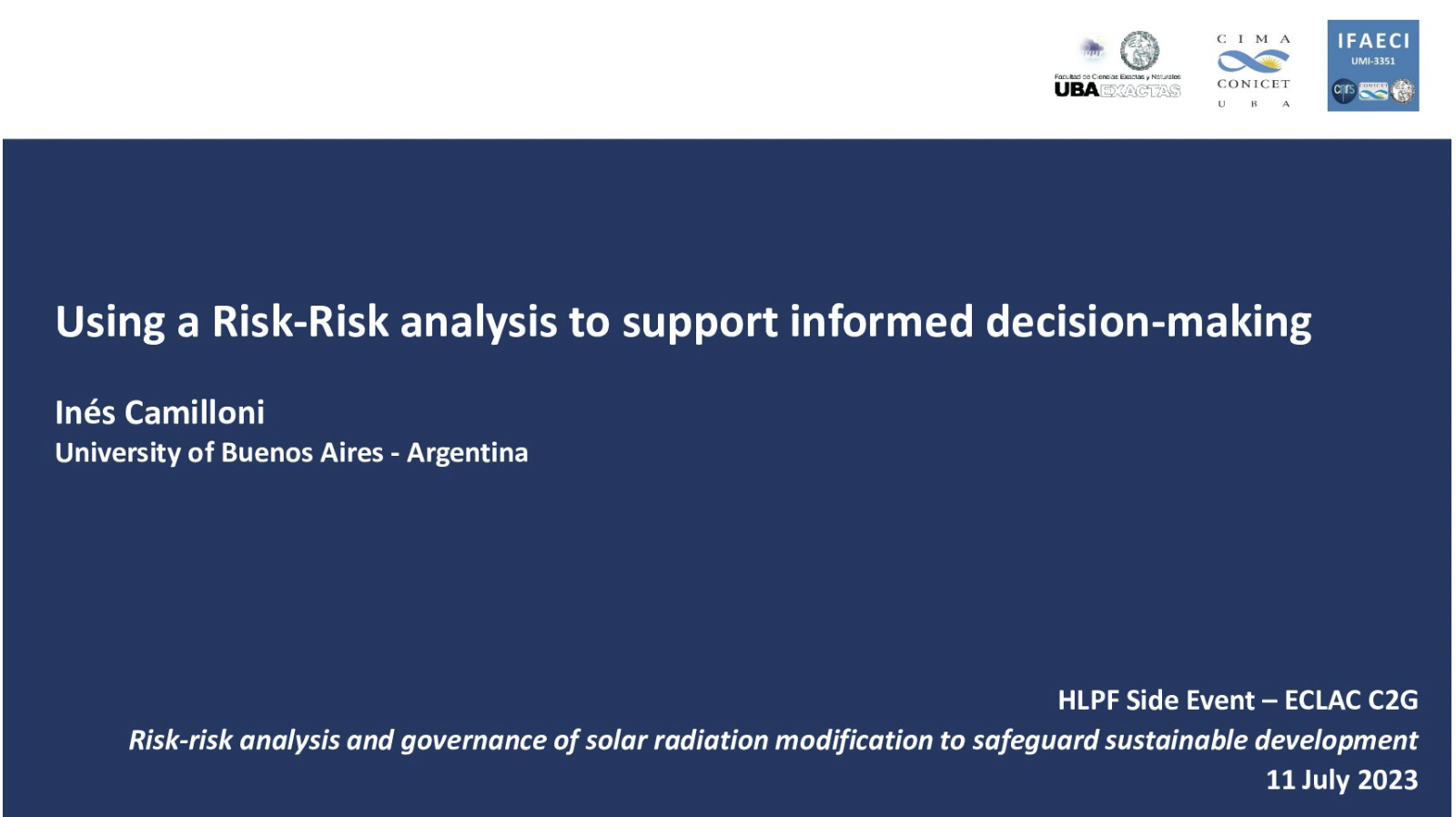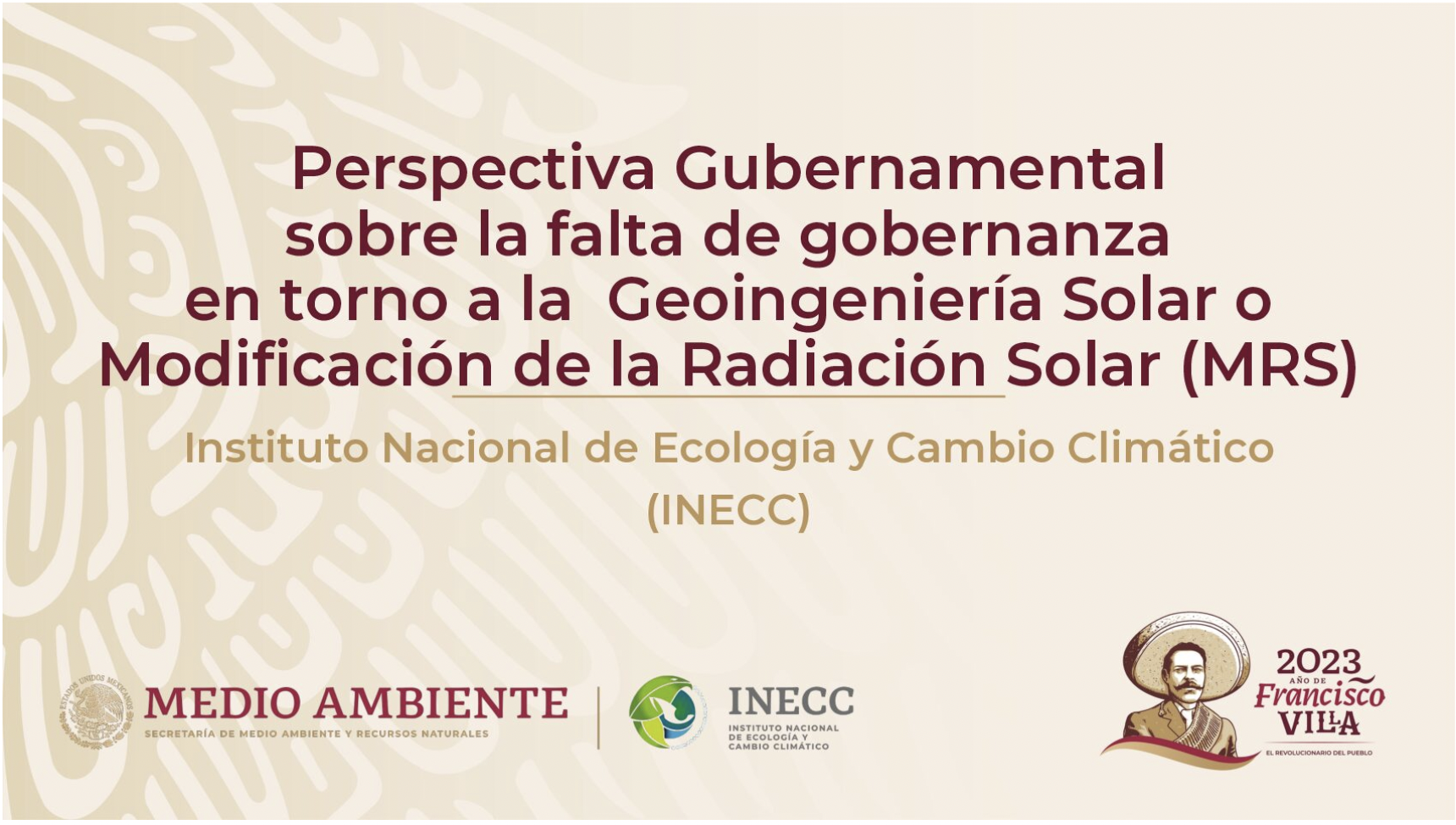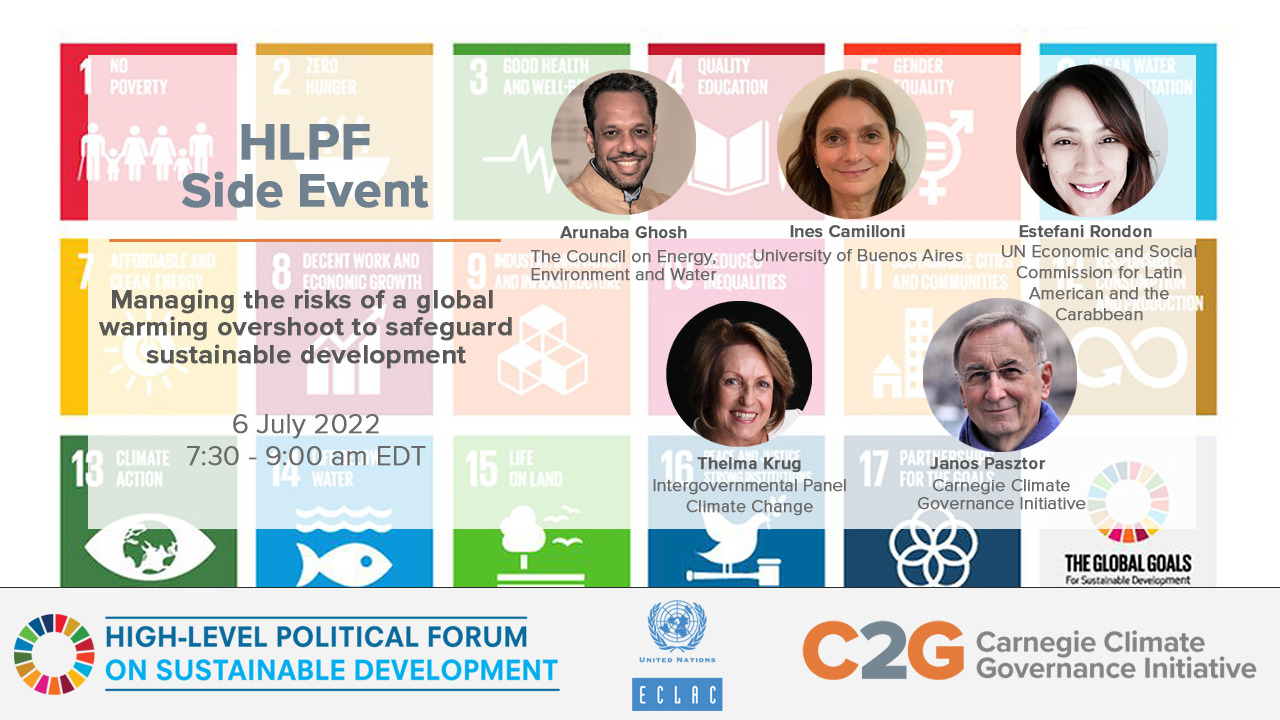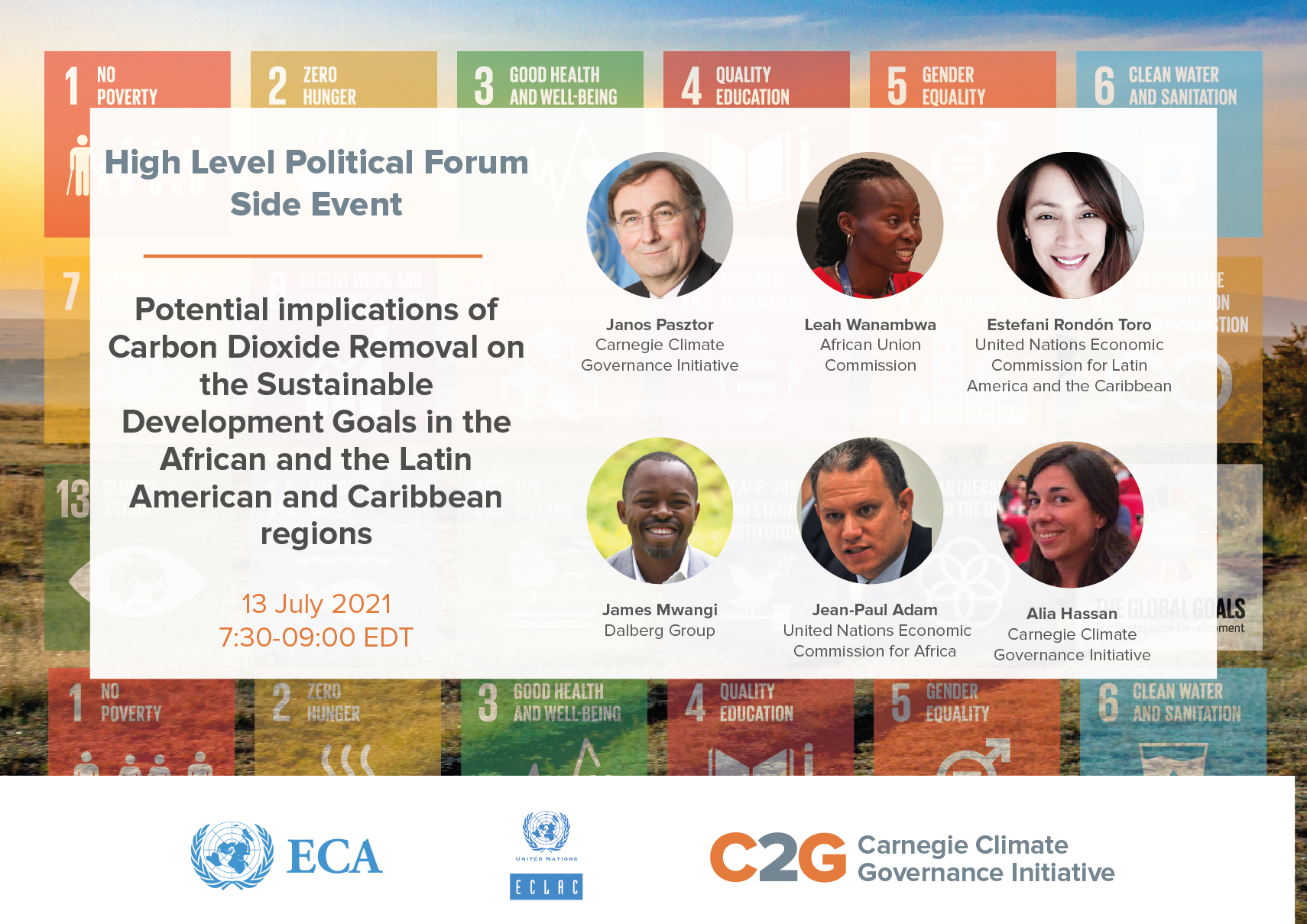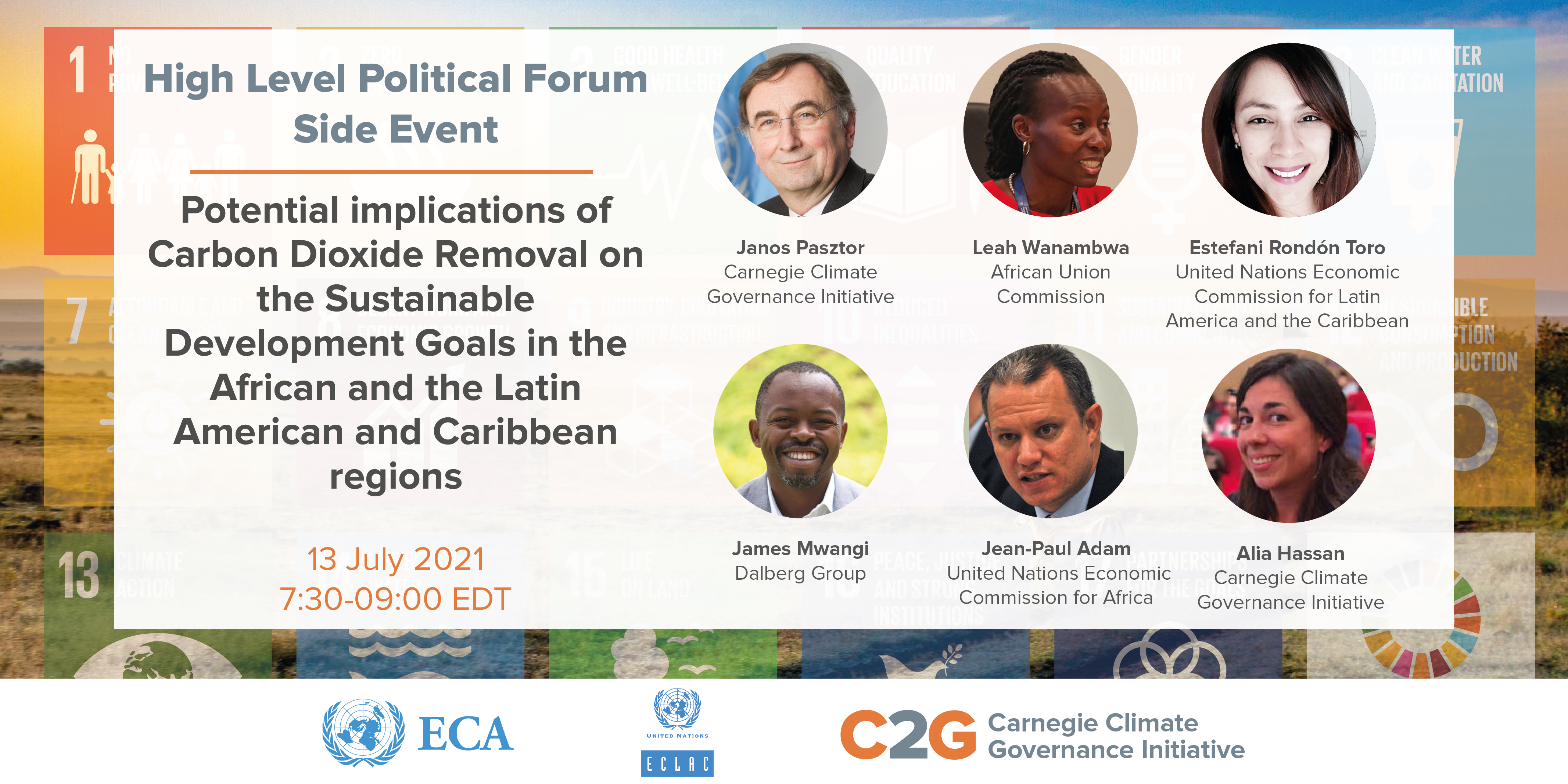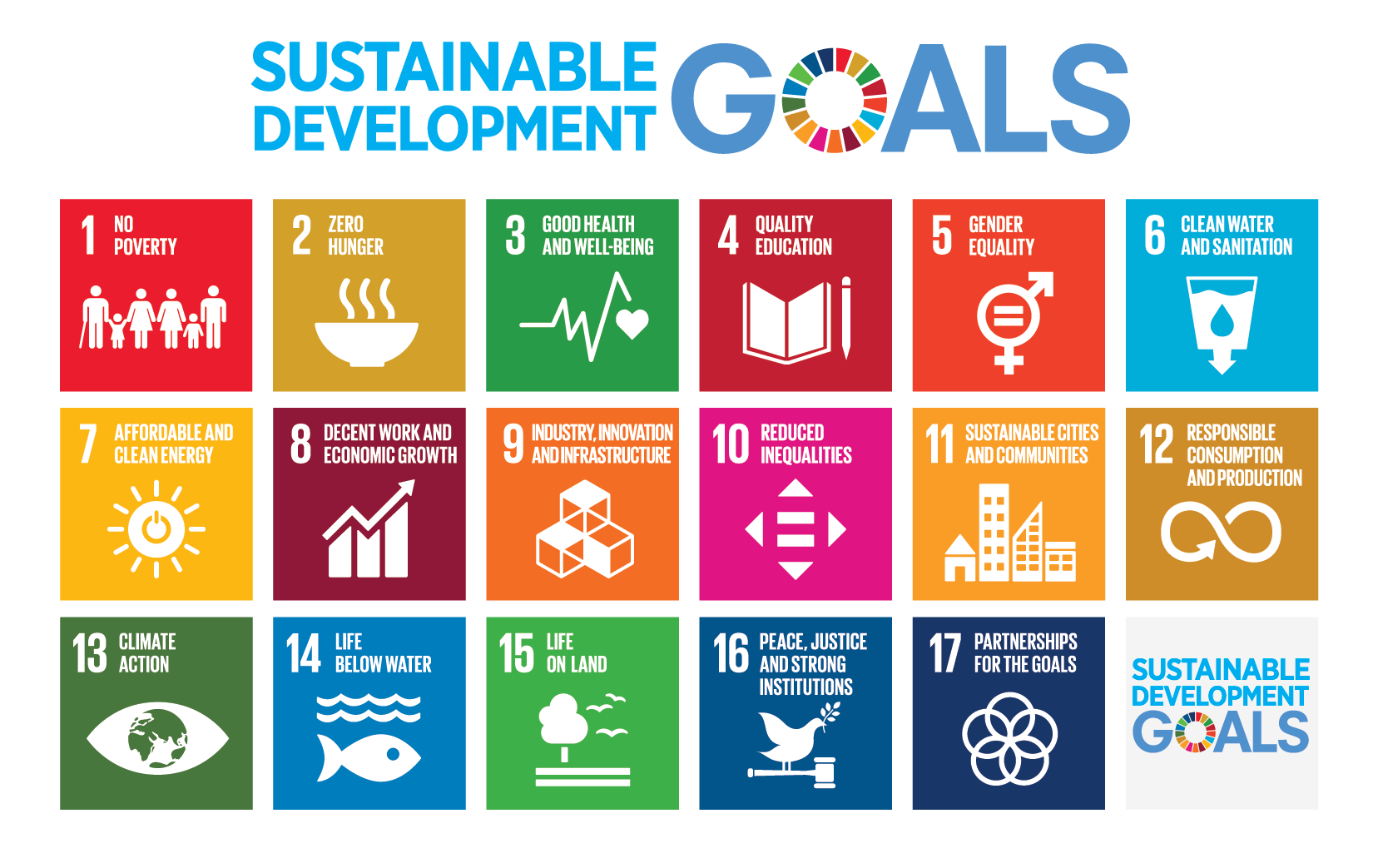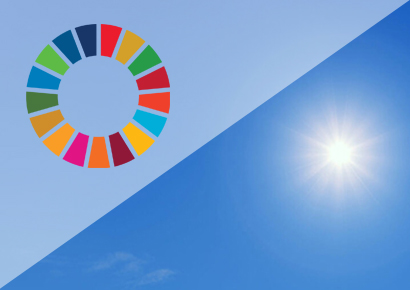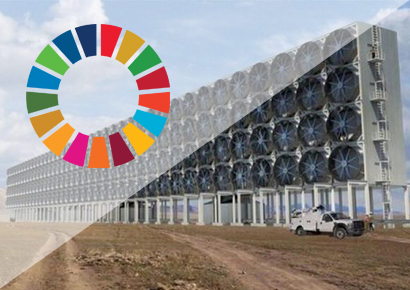Risk-risk Analysis and Governance of Solar Radiation Modification to Safeguard Sustainable Development
11 July 2023
8:00 – 9:30 AM (EDT)
This event was recorded on 11 July 2023, and is also available in Español.
According to the latest UNEP Emissions Gap report, policies currently in place internationally are projected to result in global warming of 2.8°C this century. Implementation of unconditional and conditional Nationally Determined Contributions (NDCs) reduce this to 2.6°C and 2.4°C respectively but the UNEP report cautions that the international community is falling far short of the Paris goals, with no credible pathway to 1.5°C in place.
As the risks of overshoot increases, in addition to deep and rapid climate mitigation and adaptation efforts, voices are calling for research on additional “emergency” options such as solar radiation modification (SRM) to keep global temperature rise in check by reflecting sunlight back into space to reduce the risks from an overshoot. In addition to its potential benefits, researching, developing, or deploying SRM poses multiple potential risks – both known and unknown. However, overshooting the Paris Agreement temperature goals also entails risks for both humanity and the ecosystems we depend on for survival, posing serious threats to the achievement of the Sustainable Development Goals.
This side event will enable participants to gain a better understanding of SRM and the gaps around its governance, examining what we do and don’t know about it, the potential risks and benefits, and why the current international governance vacuum around SRM itself poses risks. The side event will also explore how risk-risk analysis could support decision-making and why and how strengthening the capacity and inclusion of youth is essential to the governance process. During the event, we will also hear from the Government of Mexico about their position on SRM and their plans to initiate the international governance process.
This side event is co-organized with the United Nations Economic Commission for Latin America and the Caribbean (ECLAC) and the Carnegie Climate Governance Initiative (C2G).
Agenda
| Welcoming remarks | Janos Pasztor, Carnegie Climate Governance Initiative |
|
Presentations
|
Speakers
|
|
|
|
|
|
|
|
|
| Q&A | All |
| Closing remarks | Santiago Lorenzo, United Nations Economic Commission for Latin America and the Caribbean (ECLAC) |
Speakers
Nicholas Harrison, Carnegie Climate Governance Initiative
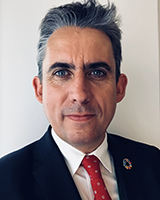 Nicholas Harrison brings 20 years’ experience working across Europe and internationally on sustainable development and climate change governance and implementation.
Nicholas Harrison brings 20 years’ experience working across Europe and internationally on sustainable development and climate change governance and implementation.
Prior to joining C2G, Harrison served as an adviser on climate action in the Executive Office of the United Nations secretary-general, supporting delivery and ratification of the Paris Agreement on climate change. Before this, as a senior consultant at Ecofys, he coordinated global teams of experts delivering high-profile international research assessments and analysis on climate change, sustainable energy, and low emissions development
In previous roles, Harrison served as an adviser on climate change and strategic intelligence for the UK Department of International Development, Department of Communities and Local Government, and the Office of the Deputy Prime Minister. He began his career in environmental engineering, moving into communications to promote renewable energy technologies, followed by various roles in city, regional, and national government, improving the use of data and evidence to deliver more sustainable development.
Harrison has written and presented widely on climate change and sustainable development, served on the Sustainable Communities committee of the British Standards Institution (BSI) and worked extensively to promote integrated multi-level governance and the role of cities, states, and other non-state actors in climate action.
He holds an MSc in organisational psychology from City University, London, is a fellow of LEAD International and the Norfolk Charitable Trust, and is an independent expert for the Climate KIC, Europe’s largest public-private innovation partnership focused on climate innovation to mitigate and adapt to climate change.
Matthias Honegger, Senior Research Associate, Perspectives Climate Research
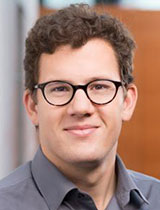 Matthias Honegger is a research associate with the Institute for Advanced Sustainability Studies, climate policy consultant with Perspectives Climate Research, and PhD candidate at Utrecht University. After his Masters in environmental sciences from the Swiss Federal Institute of Technology he has worked on sectoral mitigation policies, national mitigation targets, UNFCCC negotiations and the emerging governance of geoengineering. Matthias researches differences in climate policy negotiators’ and observers’ views of solar geoengineering and carbon removal, their roots in diverging values and worldviews and the resulting tensions between popular expectations, economic models and actual policy planning and implementation. He is author and co-author on several articles, commentaries and reports on issues of policy design for carbon dioxide removal and solar radiation management geoengineering and has led the first assessment of potential effects that deployment of such technologies could have on the pursuit of the entirety of the Sustainable Development Goals.
Matthias Honegger is a research associate with the Institute for Advanced Sustainability Studies, climate policy consultant with Perspectives Climate Research, and PhD candidate at Utrecht University. After his Masters in environmental sciences from the Swiss Federal Institute of Technology he has worked on sectoral mitigation policies, national mitigation targets, UNFCCC negotiations and the emerging governance of geoengineering. Matthias researches differences in climate policy negotiators’ and observers’ views of solar geoengineering and carbon removal, their roots in diverging values and worldviews and the resulting tensions between popular expectations, economic models and actual policy planning and implementation. He is author and co-author on several articles, commentaries and reports on issues of policy design for carbon dioxide removal and solar radiation management geoengineering and has led the first assessment of potential effects that deployment of such technologies could have on the pursuit of the entirety of the Sustainable Development Goals.Inés Camilloni, Associate Professor, Department of Atmospheric and Ocean Sciences, University of Buenos Aires, Argentina
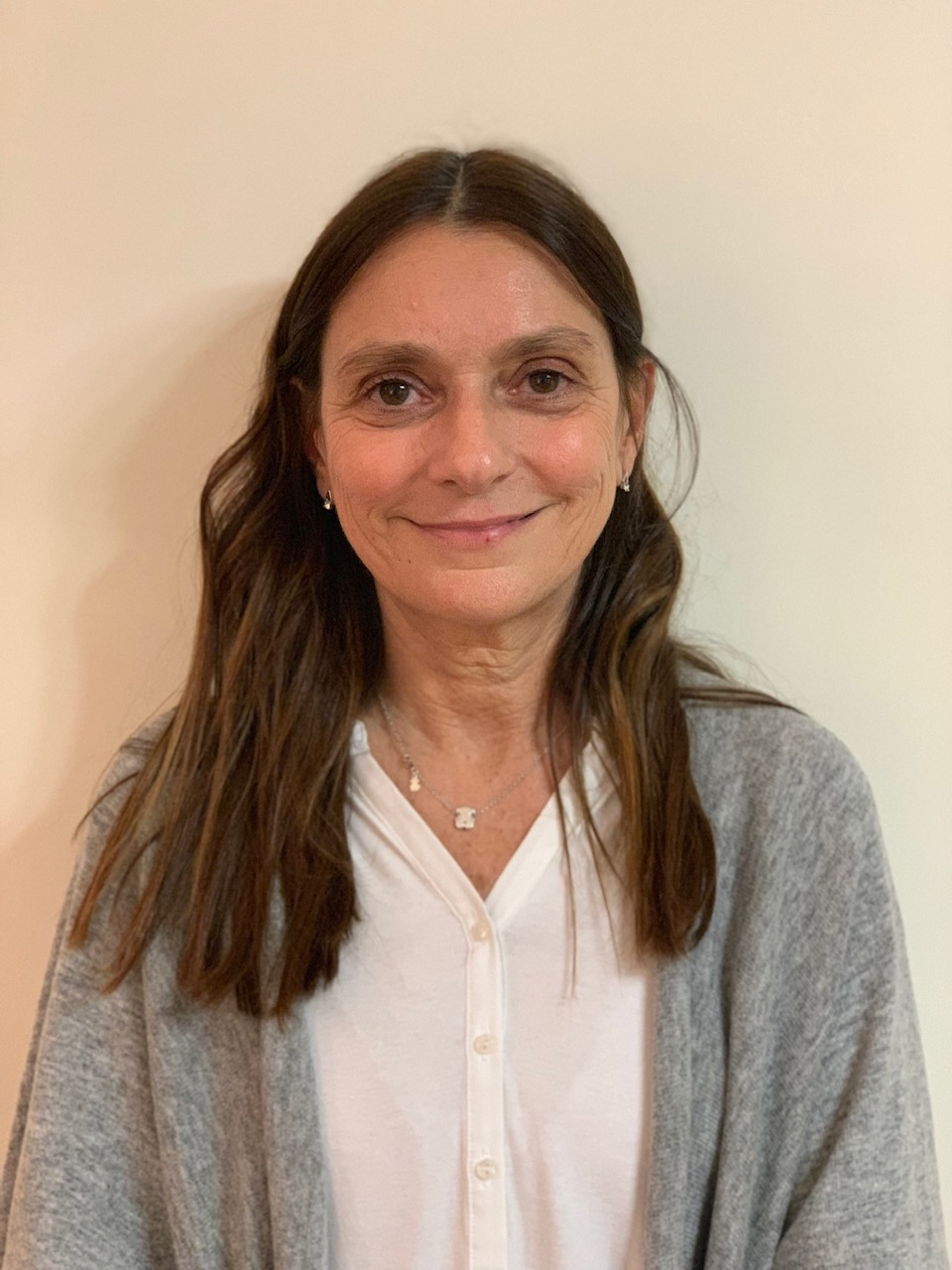 Dr. Ines Camilloni is a Lead Author of the chapter on Impacts of 1.5°C global warming on natural and human systems of the IPCC Special Report on Global warming of 1.5°C (SR15) and of the chapter on Near-term Climate Change: Projections and Predictability of the IPCC Fifth Assessment Report. She is a Professor at the Department of Atmospheric and Ocean Sciences of the University of Buenos Aires and Senior Researcher of the Center for Atmosphere and Ocean Research (CIMA), jointly sponsored by the Argentina National Research Council (CONICET) and the University of Buenos Aires (UBA).
Dr. Ines Camilloni is a Lead Author of the chapter on Impacts of 1.5°C global warming on natural and human systems of the IPCC Special Report on Global warming of 1.5°C (SR15) and of the chapter on Near-term Climate Change: Projections and Predictability of the IPCC Fifth Assessment Report. She is a Professor at the Department of Atmospheric and Ocean Sciences of the University of Buenos Aires and Senior Researcher of the Center for Atmosphere and Ocean Research (CIMA), jointly sponsored by the Argentina National Research Council (CONICET) and the University of Buenos Aires (UBA).
She is the principal investigator of the SRMGI study “Hydrological impacts of solar radiation management in the La Plata Basin in South America”. She has participated, leaded or coordinated several recognized national and international research projects related with climate variability and change, and has authored several peer-reviewed scientific journal articles and book chapters.
She was a member of the Argentinean team that developed the report on present and future climate trends in Argentina for the “3rd National Communication of Climate Change” and the related web-based dissemination of climate data and scenarios to support impact studies in Argentina.
Clara Botto, Brazil

Clara Botto currently serves as the Liaison Officer on Environmental Governance at Youth Environment Europe (YEE) – a bottom-up network of youth and youth organisations in the European Region. She has experience in on-ground work, including in countries of the global south, together with understanding and advocacy on environmental policy at the UN. She has been engaged in Brazil and globally for the past 6 years, having been the creative director of the artivist movement LivMundi Brota and directed documentaries about migration, education and the climate crisis.
Clara has served in UNEP’s Steering Committee of the Children and Youth Major Group as regional facilitator for the European region, is part of UNECE’s Education for Sustainable Development youth platform, and has contributed in representing young people in conferences such as the UN Youth Assembly, Global Development Leadership Seminars (IMF, World Bank), Gaia Education, Climate Reality Project, the Economy of Francesco, International Seminar on Internet Governance (JEF Europe), World Forum for Democracy (Council of Europe), Stockholm+50, Aarhus Convention, UN Ocean Conference, Conference on the Future of Europe and Environment for Europe Ministerial Conference.
She holds a Bachelor’s degree in Business, Creative Economy and Marketing, where she conducted research on sustainable fashion and the universities’ lack of preparation to equip youth for sustainable development, and has recently finished a Master’s in International Development and Public Policy, having written a thesis about deep-sea mining as a case study to prepare future policymakers.
Janos Pasztor, Executive Director, Carnegie Climate Governance Initiative

Earlier, he was Acting Executive Director for Conservation (2014), and Policy and Science Director (2012-2014), at WWF International. He directed the UNSG’s Climate Change Support Team (2008-2010) and later was Executive Secretary of the UNSG’s High-level Panel on Global Sustainability (2010-2012). In 2007 he directed the Geneva-based UN Environment Management Group (EMG). During 1993-2006 he worked and over time held many responsibilities at the Climate Change Secretariat (UNFCCC), initially in Geneva and later in Bonn.
His other assignments included: the Secretariat of the UN Conference on Environment and Development (Earth Summit ’92); Stockholm Environment Institute; United Nations Environment Programme (UNEP); Secretariat of the World Commission on Environment and Development (Brundtland Commission); the Beijer Institute; and the World Council of Churches. He has BSc and MSc degrees from the Massachusetts Institute of Technology (MIT).
Agustín Ávila, Director General de Políticas para la Acción Climática en la Secretaría de Medio Ambiente y Recursos Naturales (SEMARNAT) y Encargado del despacho de la Dirección General del Instituto Nacional de Ecología y Cambio Climático (INECC)
Santiago Lorenzo, Head of the Climate Change Economics, United Nations Economic Commission for Latin America and the Caribbean (ECLAC)
Santiago Lorenzo Alonso is the Head of the Climate Change Economics Unit at the Economic Commission for Latin America and the Caribbean (ECLAC). He previously worked as a Coordinator of Sustainable Finance at the Climate Action Network and as Global Coordinator of Climate and Finance for WWF. Alonso has also worked as an independent consultant on environmental and policy issues, including economic instruments for environmental protection, environmental tax reform, and financing for sustainable development. He has a degree in economics from the Metropolitan Autonomous University and a master’s degree in environmental diagnosis and evaluation from the London School of Economics and Political Science. Alonso has participated in various international negotiations and has taught courses in environmental economics for the Mexican government, UNEP, the government of Rwanda, and the National Autonomous University of Mexico.
Prior to his current position, Alonso served as Deputy Director General for Multilateral Environmental Agreements at Mexico’s Ministry of Environment and Natural Resources. He is a member of the Fiscal Instruments Advisory Group of the Green Growth Knowledge Platform and is a PhD candidate in Environmental Sciences, specializing in ecological economics, at the Autonomous University of Barcelona. Alonso has several publications on sustainable development, particularly in economics and biodiversity, finance, and climate change.
Presentations
The risks from the lack of formal and robust SRM governance
Nicholas Harrison, Carnegie Climate Governance Initiative
Potential implications of SRM for the achievement of the Sustainable Development Goals
Matthias Honegger, Perspectives Climate Research
Using a Risk-Risk analysis to support informed decision-making
Inés Camilloni, University of Buenos Aires
